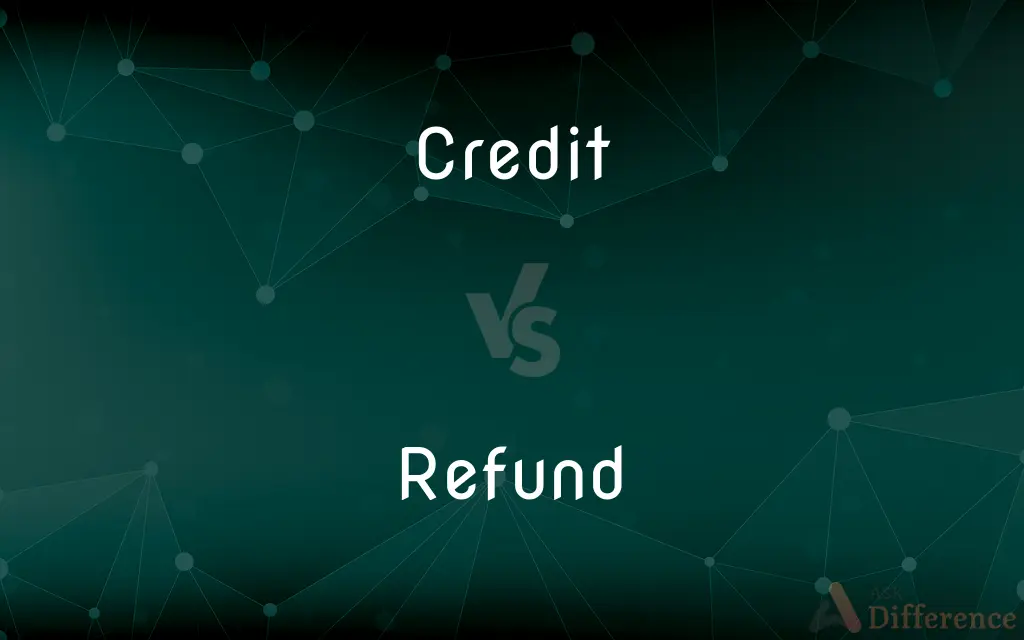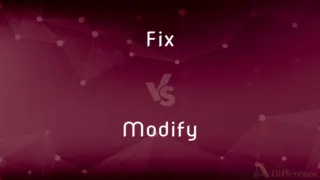Credit vs. Refund — What's the Difference?
By Maham Liaqat & Urooj Arif — Updated on March 25, 2024
The liver is essential for metabolism and detoxification, while the spleen plays a key role in immune response and blood filtration.

Difference Between Credit and Refund
Table of Contents
ADVERTISEMENT
Key Differences
The liver, the body's largest internal organ, performs over 500 functions, including metabolism of fats, proteins, and carbohydrates, detoxification of toxins, and production of bile. On the other hand, the spleen, significantly smaller, acts as a blood filter, removing old red blood cells, and plays a crucial role in the immune response by producing antibodies.
While the liver is located in the upper right quadrant of the abdomen and has a unique ability to regenerate tissue, the spleen is found in the upper left quadrant and does not have regenerative properties. This difference highlights the liver's resilience and the spleen's vulnerability to injury.
The liver's role in the body is multifaceted, extending to the storage of vitamins and minerals and regulation of blood clotting factors. Conversely, the spleen stores white blood cells and platelets, releasing them into the bloodstream as needed, emphasizing its role in immune surveillance and response.
Diseases of the liver, such as hepatitis, cirrhosis, and liver cancer, affect its ability to perform critical metabolic and detoxification processes. Meanwhile, spleen disorders, like splenomegaly (enlarged spleen) and asplenia (absent spleen function), primarily impact the body's ability to fight infection and filter blood.
Despite their distinct functions and vulnerabilities, both organs are crucial to the body's overall health. The liver's involvement in such a wide range of bodily functions makes it indispensable, while the spleen's role in the immune system and blood health is equally vital.
ADVERTISEMENT
Comparison Chart
Primary Function
Metabolism, detoxification, bile production
Blood filtration, immune response
Location
Upper right abdomen
Upper left abdomen
Regeneration
Capable of regenerating tissue
Does not regenerate
Role in Immunity
Metabolizes and detoxifies substances
Produces antibodies, filters blood
Diseases
Hepatitis, cirrhosis, liver cancer
Splenomegaly, asplenia
Size and Shape
Larger, lobed
Smaller, oval
Blood Storage
Does not store blood
Stores white blood cells and platelets
Function in Blood
Regulates clotting factors
Removes old red blood cells
Vulnerability
Susceptible to alcohol, toxins
Vulnerable to physical injury
Importance
Essential for metabolism, digestion, detoxification
Key for immune system function and blood health
Compare with Definitions
Credit
The liver is a vital organ involved in metabolism, detoxification, and protein synthesis.
The liver processes nutrients absorbed from the digestive tract.
Refund
Does not regenerate; removal can affect the body's ability to fight infections.
Removal of the spleen requires patients to take precautions against infections.
Credit
It has a unique ability to regenerate damaged tissue.
After partial removal, the liver can regrow to its original size.
Refund
It is involved in producing and storing white blood cells and platelets.
The spleen releases white blood cells to fight infection.
Credit
Plays a critical role in producing bile, which aids in digestion.
Bile produced by the liver helps break down fats in the small intestine.
Refund
Acts as a blood filter in the immune system.
The spleen filters out and destroys old or damaged blood cells.
Credit
Detoxifies various metabolites and is involved in blood clotting.
The liver detoxifies harmful substances and metabolizes drugs.
Refund
Vulnerable to injury due to its soft, spongy structure.
A significant impact to the left rib cage can cause splenic rupture.
Credit
Stores vitamins, minerals, and produces blood plasma proteins.
The liver stores vitamins A, D, E, K, and B12 for long-term use.
Refund
The spleen filters blood, removes old red blood cells, and plays a role in the immune response.
The spleen can hold a reserve of blood that can be released in case of sudden hemorrhage.
Credit
Credit (from Latin credit, "(he/she/it) believes") is the trust which allows one party to provide money or resources to another party wherein the second party does not reimburse the first party immediately (thereby generating a debt), but promises either to repay or return those resources (or other materials of equal value) at a later date. In other words, credit is a method of making reciprocity formal, legally enforceable, and extensible to a large group of unrelated people.
Refund
To give back, especially money; return or repay
Refunded the purchase price.
Credit
An arrangement for deferred payment of a loan or purchase
A store that offers credit.
Bought my stereo on credit.
Refund
To make repayment.
Credit
The terms governing such an arrangement
Low prices and easy credit.
Refund
A repayment of funds.
Credit
The time allowed for deferred payment
An automatic 30-day credit on all orders.
Refund
An amount repaid.
Credit
The deduction of a payment made by a debtor from an amount due.
Refund
(transitive) To return (money) to (someone); to reimburse.
If you find this computer for sale anywhere at a lower price, we’ll refund you the difference.
Credit
The positive balance or amount remaining in a person's account.
Refund
To supply (someone) again with funds.
To refund a railroad loan
Credit
A credit line.
Refund
To pour back (something).
Credit
Reputation for solvency and integrity entitling a person to be trusted in buying or borrowing
You should have no trouble getting the loan if your credit is good.
Refund
An amount of money returned.
If the camera is faulty, you can return it to the store where you bought it for a full refund.
Credit
Official certification or recognition that a student has successfully completed a course of study
He received full credit for his studies at a previous school.
Refund
To fund again or anew; to replace (a fund or loan) by a new fund; as, to refund a railroad loan.
Credit
A unit of study so certified
This course carries three credits.
Refund
To pour back.
Were the humors of the eye tinctured with any color, they would refund that color upon the object.
Credit
Often credits An acknowledgment of work done, as in the production of a motion picture or publication
At the end of the film we stayed to watch the credits.
Refund
To give back; to repay; to restore.
A governor, that had pillaged the people, was . . . sentenced to refund what he had wrongfully taken.
Credit
Influence based on the good opinion or confidence of others
Used his credit with the police to get them to devote more time to the case.
Refund
To supply again with funds; to reimburse.
Credit
Recognition or approval for an act, ability, or quality
Gave them credit for a job well done.
Refund
Money returned to a payer
Credit
A source of honor or distinction
This exceptional athlete is a credit to our team.
Refund
The act of returning money received previously
Credit
A reputation for sound character or quality; standing
It is to their credit that they worked so hard without complaining.
Refund
Pay back;
Please refund me my money
Credit
Belief or confidence in the truth of something
"They give no credit to [his] scurrilous assertions" (John Edgar Wideman).
Credit
To give as a credit
Credited $500 to her account.
Credit
To give a credit to
Credit an account.
Credit
To give or award an educational credit to.
Credit
To regard as having performed an action or being endowed with a quality
Had to credit them with good intentions.
Credit
To ascribe or attribute
Credit the invention to him.
Credited her recovery to an innovative treatment.
Credit
(Archaic) To bring honor or distinction to.
Credit
(transitive) To believe; to put credence in. British usage?
Someone said there were over 100,000 people there, but I can't credit that.
Credit
To add to an account.
Credit accounts receivable with the amount of the invoice.
For the payroll period credit employees' tips to their wages paid account and debit their minimum wage payable account.
The full amount of the purchase has been credited to your account.
Credit
(transitive) To acknowledge the contribution of.
I credit the town council with restoring the shopping district.
Credit the point guard with another assist.
Credit
(transitive) To bring honour or repute upon; to do credit to; to raise the estimation of.
Credit
Reliance on the truth of something said or done; faith; trust.
Credit
(uncountable) Recognition, respect and admiration.
I give you credit for owning up to your mistake.
He arrived five minutes late, but to his credit he did work an extra ten minutes at the end of his shift.
Credit
(countable) Acknowledgement of a contribution, especially in the performing arts.
She received a singing credit in last year's operetta.
Credit
Written titles and other information about the TV program or movie shown at the beginning and/or end of the TV program or movie.
They kissed, and then the credits rolled.
Credit
A privilege of delayed payment extended to a buyer or borrower on the seller's or lender's belief that what is given will be repaid.
In view of your payment record, we are happy to extend further credit to you.
Credit
The time given for payment for something sold on trust.
A long credit or a short credit
Credit
A person's credit rating or creditworthiness, as represented by their history of borrowing and repayment (or non payment).
What do you mean my credit is no good?
Credit
(accounting) An addition to certain accounts; the side of an account on which payments received are entered.
Credit
(tax accounting) A reduction in taxes owed, or a refund for excess taxes paid.
Didn't you know that the IRS will refund any excess payroll taxes that you paid if you use the 45(B) general business credit?
Credit
A source of value, distinction or honour.
That engineer is a credit to the team.
Credit
(science fiction) A unit of currency used in a fictional universe or timeframe.
To repair your star cruiser will cost 100,000 credits.
Credit
A nominal unit of value assigned outside of a currency system.
Would you like to play? I put in a dollar and I've got two credits left.
Credit
(uncountable) Recognition for having taken a course (class).
If you do not come to class, you will not get credit for the class, regardless of how well you do on the final.
Credit
(countable) A course credit, a credit hour – used as measure if enough courses have been taken for graduation.
Dude, I just need 3 more credits to graduate – I can take socio-linguistics of Swahili if I want.
Credit
Reliance on the truth of something said or done; belief; faith; trust; confidence.
When Jonathan and the people heard these words they gave no credit unto them, nor received them.
Credit
Reputation derived from the confidence of others; esteem; honor; good name; estimation.
John Gilpin was a citizenOf credit and renown.
Credit
A ground of, or title to, belief or confidence; authority derived from character or reputation.
The things which we properly believe, be only such as are received on the credit of divine testimony.
Credit
That which tends to procure, or add to, reputation or esteem; an honor.
I published, because I was told I might please such as it was a credit to please.
Credit
Influence derived from the good opinion, confidence, or favor of others; interest.
Having credit enough with his master to provide for his own interest.
Credit
Trust given or received; expectation of future playment for property transferred, or of fulfillment or promises given; mercantile reputation entitling one to be trusted; - applied to individuals, corporations, communities, or nations; as, to buy goods on credit.
Credit is nothing but the expectation of money, within some limited time.
Credit
The time given for payment for lands or goods sold on trust; as, a long credit or a short credit.
Credit
The side of an account on which are entered all items reckoned as values received from the party or the category named at the head of the account; also, any one, or the sum, of these items; - the opposite of debit; as, this sum is carried to one's credit, and that to his debit; A has several credits on the books of B.
He touched the dead corpse of Public Credit, and it sprung upon its feet.
Credit
To confide in the truth of; to give credence to; to put trust in; to believe.
How shall they creditA poor unlearned virgin?
Credit
To bring honor or repute upon; to do credit to; to raise the estimation of.
You credit the church as much by your government as you did the school formerly by your wit.
Credit
To enter upon the credit side of an account; to give credit for; as, to credit the amount paid; to set to the credit of; as, to credit a man with the interest paid on a bond.
Crove, Helmholtz, and Meyer, are more than any others to be credited with the clear enunciation of this doctrine.
Credit
Approval;
Give her recognition for trying
He was given credit for his work
Give her credit for trying
The credits were given at the end of the film
Credit
Money available for a client to borrow
Credit
An accounting entry acknowledging income or capital items
Credit
Used in the phrase `to your credit' in order to indicate an achievement deserving praise;
She already had several performances to her credit
Credit
Arrangement for deferred payment for goods and services
Credit
Recognition by a college or university that a course of studies has been successfully completed; typically measured in semester hours
Credit
A short note recognizing a source of information or of a quoted passage;
The student's essay failed to list several important citations
The acknowledgments are usually printed at the front of a book
The article includes mention of similar clinical cases
Credit
An entry on a list of persons who contributed to a film or written work
Credit
Give someone credit for something;
We credited her for saving our jobs
Credit
Give credit for;
She was not properly credited in the program
Credit
Accounting: enter as credit;
We credit your account with $100
Credit
Have trust in; trust in the truth or veracity of
Common Curiosities
What is the primary function of the liver?
The liver's primary functions include metabolism, detoxification, and bile production.
How do liver diseases affect the body?
Liver diseases can impair the body's metabolism, detoxification processes, and blood clotting mechanisms.
Can the liver function properly after damage?
The liver can often function properly after damage if enough healthy tissue remains, due to its regenerative capabilities.
Why is the spleen vulnerable to injury?
The spleen's soft, spongy structure makes it particularly vulnerable to physical injury.
Can the body fight infections without a spleen?
The body can still fight infections without a spleen, but with reduced efficiency, making infections more dangerous.
Can the spleen regenerate like the liver?
No, the spleen cannot regenerate; once damaged, it does not regrow.
Is the spleen essential for survival?
While important, the body can adapt without a spleen, but susceptibility to infections may increase.
Where is the liver located in the human body?
The liver is located in the upper right quadrant of the abdomen.
What role does the spleen play in the immune system?
The spleen produces antibodies and filters blood, playing a critical role in the immune response.
What are common diseases of the spleen?
Common spleen diseases include splenomegaly and asplenia.
What vitamins does the liver store?
The liver stores vitamins A, D, E, K, and B12, among others.
How does the spleen affect blood health?
The spleen helps maintain healthy blood cells and platelets, ensuring the blood system's efficiency.
What happens if the spleen is removed?
After spleen removal, individuals may need vaccinations and antibiotics to help prevent infections.
What is the significance of bile production in the liver?
Bile aids in the digestion and absorption of dietary fats and fat-soluble vitamins.
How does alcohol consumption affect the liver?
Excessive alcohol can damage liver cells, leading to conditions like fatty liver, hepatitis, and cirrhosis.
Share Your Discovery

Previous Comparison
Sunset vs. Sunfall
Next Comparison
Fix vs. ModifyAuthor Spotlight
Written by
Maham LiaqatCo-written by
Urooj ArifUrooj is a skilled content writer at Ask Difference, known for her exceptional ability to simplify complex topics into engaging and informative content. With a passion for research and a flair for clear, concise writing, she consistently delivers articles that resonate with our diverse audience.















































